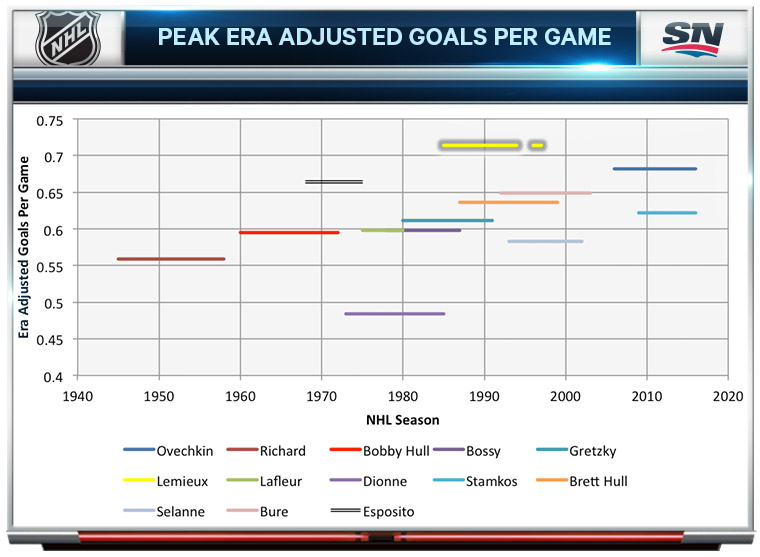Most observers will agree Alex Ovechkin is one of the best goal scorers they have ever seen in the NHL. Most fans sit in awe of the numbers he posts year after year in an era where goals are seemingly sucked out of the game. Despite endless debates over goaltender equipment, size of nets and ways to crack down on obstruction, the ‘Great 8’ continues to score at rates that haven’t been seen since the 1980s.
Since 2007-08 Ovechkin has led the NHL in goal scoring an incredible five times. Even if we don’t adjust for the era he plays in, Ovechkin ranks in the top 10 in goals scored by any NHL player before the age of 30 – and every skater in the top 17 other than Ovechkin and Jaromir Jagr has already been inducted into the Hockey Hall of Fame.
Ovechkin has scored 50 goals six times. Only five other skaters in NHL history have managed to match or exceed that feat: Wayne Gretzky, Mario Lemieux, Mike Bossy, Marcel Dionne and Guy Lafleur. All five of those skaters produced multiple 50-goal seasons during the wildly turbulent and expansionist ‘70s and ‘80s. From 1975 to 1990 Gretzky and Bossy both produced nine 50-goal seasons, Dionne had six, Lafleur had five and Lemieux had three.
The reality is the NHL of the 1980s had a massive disparity in talent spread around the league thanks to rapid-fire expansion and concentration of talent on teams such as the Oilers (Gretzky) and Islanders (Bossy). The NHL added 16 teams between the years 1967 and 1979, expanding from the Original Six to 22 teams, with the California Golden Seals/Cleveland Barons franchise folding prior to 1980. In contrast, the current NHL hasn’t expanded in 15 years, the longest uninterrupted stretch without expansion since the Original Six era.
NHL roster sizes have remained fixed for well over a decade, and as the game has grown internationally, more high-level athletes have joined the NHL. Thus the gap in talent from the best to the worst NHL skater and goalie has been narrowing, so we need a way to fairly compare past eras to the current one. We can accomplish this by adjusting observed results.
If we wish to adjust for era in order to make a more reasonable comparison, we can adjust for talent spread, the number of games in a season, roster size, and the average goal-scoring rate in any given year. Additionally, in order to be fair in the analysis we should account for the fact that some skaters weren’t playing full seasons due to injury or illness (specifically Lemieux missed extended periods due to cancer treatment).
Since we want to see where Ovechkin fits in amongst the all-time greats, it also makes sense to focus on the peak performance of the best goal scorers in history. To that end, when looking at era-adjusted goals per game, we can take the average of the scorer’s peak seasons from when they first surpassed the threshold of 0.400 goals per game and then dropped down below it. A scoring rate of 0.400 goals per game corresponds to slightly less than 33 goals in an 82-game season.
Essentially, by looking at the era-adjusted goal-scoring rate Ovechkin has maintained so far in his career, we can see the only sniper in NHL history who has exceeded his production rate at their peak was Lemieux. The only problem with crediting Lemieux as his superior is Lemieux spread his peak across three distinct stints in the NHL due to a variety of ailments that often led to him playing less than 30 games in a season.
Ovechkin is that rare combination of elite skill and physical strength that has resulted in him missing very few games and he has given no indication he is slowing down. If any skater can continue the insane pace he has set for himself it would be Ovechkin. He is easily the best NHL goal scorer we have seen in the past decade, and his results imply he is arguably the best goal scorer in NHL history.
It will be extremely interesting to see where Ovechkin’s career goes over the next few years as he approaches his mid-30s. Most skaters slow down after the age of 35, but often elite offensive performers continue to produce into their late 30s and even 40s (like Jaromir Jagr) if they can stay healthy.
If Ovechkin continues to avoid injury and maintains his physical dominance in a tight-checking league, it is scary to imagine what he could be capable of as the NHL seeks to promote more goal scoring.
Ovechkin is quantifiably one of the top two goal scorers in NHL history, and given his durability and consistency, he is arguably the best-ever.









